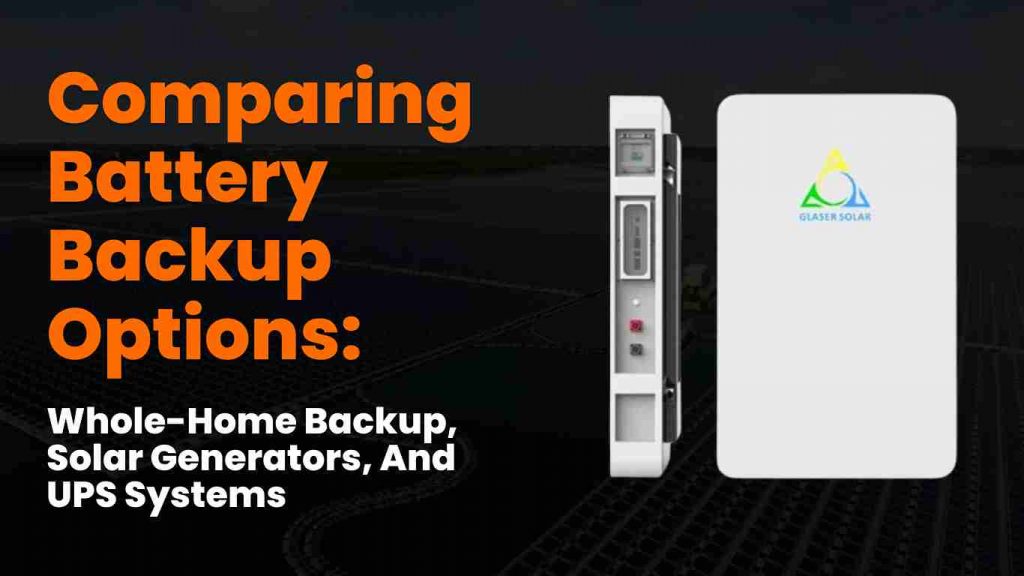Battery Backup (Key takeaways)
- UPS systems are ideal for protecting electronics from voltage fluctuations and providing short-term backup power for small devices. Recommended models: APC Back-UPS BE600M1 (budget-friendly) and CyberPower CP1500PFCLCD (high power).
- Solar generators offer portability and can power multiple appliances for several hours. Top choices: Jackery Explorer 500, Goal Zero Yeti 1400 Lithium, and Point Zero Energy Titan 1000.
- Whole-home batteries, often called solar batteries, can provide backup power for an entire home for extended periods. Leading options: LG Chem Resu Prime, sonnenCore, and Tesla Powerwall.
Understanding battery backup solutions
Battery backup systems ensure that your essential devices stay powered during electrical outages. Whether you want to protect a single device, power a few appliances, or keep your entire home running, there’s a battery backup solution for you. The three main types are:
- Uninterruptible Power Supply (UPS): A compact solution designed to protect sensitive electronics and provide short bursts of backup power.
- Solar generators: Portable batteries that can be charged via solar panels and offer power for several appliances.
- Whole-home batteries: Large battery systems designed to power an entire home for hours or even days.
The right choice depends on your power needs and budget. Let’s break down each option.
UPS (Uninterruptible power supply)
Best for: Short-term power backup and surge protection
A UPS (Uninterruptible power supply) is a device that provides immediate power during a blackout, allowing you to save work, shut down electronics safely, and prevent damage from voltage fluctuations.
Why use a UPS?
- Protects sensitive electronics from power surges and brownouts.
- Provides temporary power for devices like computers, routers, and servers.
- Prevents data loss by keeping systems running long enough for a safe shutdown.
Types of UPS systems
Some UPS models are designed specifically for routers (mini-UPS systems) and provide up to four hours of backup power for internet access during an outage. Others are built for home office setups, offering enough power to sustain a PC, modem, and a few peripherals.
Best UPS models
- APC Back-UPS BE600M1 (Budget option) – Small and affordable, perfect for basic backup needs.
- CyberPower CP1500PFCLCD (Power option) – Offers more power and features an LCD display to monitor usage.
Solar generators
Best for: Powering multiple appliances for several hours, portable backup power
Despite their name, solar generators are not true generators but rather battery storage systems that can be recharged using solar panels, wall outlets, or even car chargers. They are ideal for both home backup power and outdoor use.
Advantages of solar generators
- Completely silent compared to traditional gas generators.
- Versatile charging options (solar, wall outlet, car charger).
- Portable and lightweight, making them great for camping and emergency use.
Power capabilities
Solar generators typically provide between 0.5 kWh and 2 kWh of power. A 0.5 kWh unit can run essential devices like lights and routers for several hours, while a 2 kWh model can power larger appliances like refrigerators and TVs for extended periods.
Best solar generators
- Jackery Explorer 500 – Small, powerful, and great for travel.
- Goal Zero Yeti 1400 Lithium – Higher capacity and can run a fridge for up to 32 hours.
- Point Zero Energy Titan 1000 – A robust option for home backup, featuring foldable solar panels.
Whole-home batteries
Best for: Powering your entire home for extended periods
Whole-home batteries, also known as solar batteries, store energy from solar panels or the grid and provide backup power when needed. They are designed to handle high-power loads, running multiple large appliances simultaneously.
Benefits of whole-home batteries
- Seamless power backup for your entire home.
- Qualify for incentives like the 30% federal solar tax credit.
- Can reduce electricity costs by storing energy during off-peak hours.
How they work
While these batteries are often used alongside solar panels, they can also be charged using grid power. However, grid charging means you won’t benefit from solar savings and won’t have power if the grid is down for an extended period.
Best whole-home batteries
- LG Chem Resu Prime – Offers 10 and 16 kWh capacities and is highly efficient.
- sonnenCore – A Tesla Powerwall competitor with advanced lithium iron phosphate technology.
- Tesla Powerwall – The most widely installed home battery, providing 13.5 kWh of storage.
Choosing the right battery backup for you
Your choice depends on your specific power needs:
- Need to protect small electronics? A UPS is the best fit.
- Need a portable backup for multiple devices? Go with a solar generator.
- Want whole-home backup power? Invest in a solar battery.
Battery backups ensure peace of mind during power outages, helping you stay connected and keep essential devices running. Whether you need a simple UPS for your computer or a whole-home battery to power your household, there’s a solution that fits your needs.




